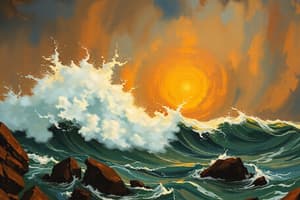Podcast
Questions and Answers
What is the main focus of the text?
What is the main focus of the text?
- Earthquakes
- Hurricanes
- Tsunamis (correct)
- Volcanic eruptions
Which natural disaster is caused by underwater seismic activity?
Which natural disaster is caused by underwater seismic activity?
- Blizzards
- Tornadoes
- Wildfires
- Tsunamis (correct)
What factor contributes to the formation of tsunamis?
What factor contributes to the formation of tsunamis?
- Underwater earthquakes (correct)
- Bacterial infection
- High atmospheric pressure
- Strong winds from the east
What is the primary cause of tsunamis?
What is the primary cause of tsunamis?
Which type of natural disaster can trigger a tsunami?
Which type of natural disaster can trigger a tsunami?
What distinguishes tsunamis from regular ocean waves?
What distinguishes tsunamis from regular ocean waves?
What geological event is likely to trigger a tsunami?
What geological event is likely to trigger a tsunami?
How do tsunamis differ from regular ocean waves in terms of wavelength and speed?
How do tsunamis differ from regular ocean waves in terms of wavelength and speed?
What factor contributes significantly to the destruction caused by both earthquakes and tsunamis?
What factor contributes significantly to the destruction caused by both earthquakes and tsunamis?
Flashcards
Tsunamis
Tsunamis
Large ocean waves caused by underwater seismic activity, like earthquakes.
Primary Cause of Tsunamis
Primary Cause of Tsunamis
Underwater earthquakes that abruptly displace large volumes of water.
Tsunami Triggers
Tsunami Triggers
Earthquakes, volcanic eruptions and landslides.
Wavelength of Tsunamis
Wavelength of Tsunamis
Signup and view all the flashcards
Tsunami Speed
Tsunami Speed
Signup and view all the flashcards
Landslides
Landslides
Signup and view all the flashcards
Study Notes
Tsunamis
- Tsunamis are caused by underwater seismic activity, such as earthquakes, volcanic eruptions, and landslides.
- The primary cause of tsunamis is the displacement of large amounts of water, usually as a result of earthquakes.
- Earthquakes can trigger tsunamis, especially those with an epicenter under the ocean.
- Tsunamis are distinguished from regular ocean waves by their extremely long wavelengths, up to 100 km, and high speeds, up to 500 mph.
- Geological events, such as earthquakes and volcanic eruptions, are likely to trigger a tsunami.
- The destruction caused by both earthquakes and tsunamis is significantly contributed to by the factor of proximity to the coast, with areas closer to the coast being more vulnerable to damage.
- Underwater seismic activity contributes to the formation of tsunamis by displacing large amounts of water, which then travels at high speeds towards the coast.
Studying That Suits You
Use AI to generate personalized quizzes and flashcards to suit your learning preferences.





